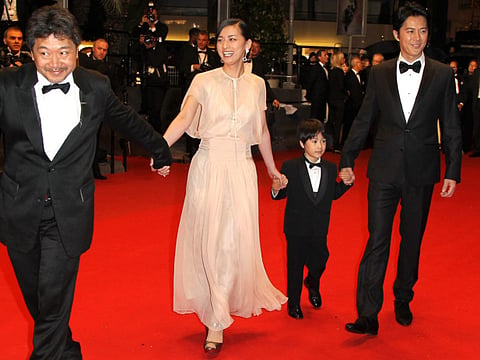Japanese switched-at-birth tale Like Father, Like Son moves Cannes
Moving Japanese drama Like Father Like Son stirs audience at Cannes Film Festival

Audiences at the Cannes Film Festival hailed a “moving” Japanese drama on Saturday about two families who fall victim to a baby swap.
Like Father, Like Son by Tokyo director Hirokazu Koreeda tells the story of a workaholic father, Ryota, and his neglected wife, who pours her energy into their six-year-old boy Keita.
One day their lives are turned upside-down by a phone call from the hospital where Keita was born, saying that a nurse had switched him with another infant hours after his arrival.
The other couple, a fun-loving shopkeeper and his adoring wife, are pinched financially but raising a happy brood of three kids.
Lawyers get involved and Ryota insists that he should raise the offspring of his own bloodline instead of the sweet-natured but directionless Keita, who only knows him as a father.
In one heartbreaking scene, Ryota hectors Keita to give up piano-playing “because you’re not very good at it, are you?”
The couples go through months of testing the waters, staging sleepovers and outings to prepare to take permanent custody of their “own” sons.
As the nature-versus-nurture debate unfolds, Ryota sees Keita as a stranger and fixates on the other boy for glimpses of his own biological traits.
“The main character is very proud, very arrogant,” the director, the father of a five-year-old girl, told reporters at the world’s top film festival.
“I wanted to show a contrast with the other father to trigger some upheaval in the values of the main character, who wants to be successful at any price,” said Koreeda, a frequent Cannes guest.
The film pointedly criticises the merciless get-ahead mentality of Japan’s professional class, pointing up the high price children pay for their parents’ ambition.
And it heaps scorn on a culture of rampant materialism, as Ryota deeply offends the other family by offering to pay them provided he can keep both boys.
Lead actor Masaharu Fukuyama, a popular singer in Japan, made his film debut in the picture.
Fukuyama, who has no children, said he was touched by its themes, having lost his parents recently.
“This may be the issue that is closest to me right now,” he said. “From being a son, I became a father.”
Britain’s daily Guardian gave the film three out of five stars, saying “Koreeda has returned to Cannes with another gentle and warm-hearted family drama”.
Trade magazine Variety said the picture was a “thoughtful exploration of the meaning of parenthood”.
“It’s the story’s intent focus on one father’s intimacy issues and redemptive transformation that makes the film so sublimely moving,” its reviewer wrote.
But The Hollywood Reporter said the film failed to grab the heart.
“Here it’s a powerful premise but one that practically precludes empathy, and viewers may be justifiably sceptical that four parents, at least three of whom seem normal, would ever consider swapping children they had nurtured that long,” it said.
Like Father, Like Son is one of 20 films vying for Cannes’ Palme d’Or top prize, to be awarded by jury president Steven Spielberg at a gala ceremony on May 26.
Sign up for the Daily Briefing
Get the latest news and updates straight to your inbox



